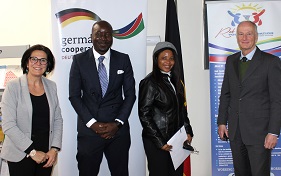
Global Council seeks to eradicate Malaria
DAVOS, Switzerland, – In a quest to end malaria for good, Bill Gates, co-chair of the Bill & Melinda Gates Foundation, and Ray Chambers, the United Nations Secretary-General’s Special Envoy for Health in Agenda 2030 and for Malaria, last week announced the launch of the End Malaria Council, a group of influential public and private sector leaders who aim to ensure malaria eradication remains a top global priority.
The Council has nine founding members, a group of whom met on the sidelines of the World Economic Forum Annual Meeting in Davos, Switzerland to discuss strategies for filling critical financing gaps in Africa, Asia and Latin America
The inaugural members will include: Bill Gates, Co-chair and Trustee, Bill & Melinda Gates Foundation, Ray Chambers, UN Secretary-General’s Special Envoy for Health in Agenda 2030 and for Malaria, Peter Chernin, Founder, Chernin Entertainment and The Chernin Group, Aliko Dangote, President and Chief Executive, Dangote Group, H.E. Idriss Déby, President of Chad (representing the African Leaders Malaria Alliance), H.E. Jakaya Kikwete, Former President, of Tanzania, Graça Machel, Founder, Foundation for Community Development, Mozambique, Luis Alberto Moreno, President, Inter-American Development Bank and H.E. Ellen Johnson Sirleaf, President of Liberia.
The launch of the End Malaria Council comes just a month after the release of the World Health Organization’s 2016 World Malaria Report, which showed remarkable progress in reducing cases and deaths from malaria since 2000, but also underscored the urgent need for global leadership, new funding and innovation to stay on track to meet targets.
The members of the End Malaria Council will work in collaboration with the Roll Back Malaria Partnership and other key partners to help countries and regions achieve their malaria control and elimination goals.
Furthermore, members of this unique group will use their voices and networks to support the work already underway by malaria field workers, scientists and experts by focusing on three areas: building political will, mobilizing resources and supporting the development of new tools to find, prevent and treat malaria.
“The next chapter of the fight against malaria starts now,” said Gates, who co-authored a report with Chambers in 2015 called Aspiration to Action: What will it take to end malaria? “For the first time in history, we have a roadmap to a world without malaria – where no one has to die from a mosquito bite ever again. With renewed focus, innovation and new commitments of leadership and funding, we can be the generation to end malaria once and for all.”
Meanwhile,Gates said thanks to strong leadership, smart investments and the hard work of the public and private sectors, the world has cut malaria deaths in half since 2000, saving more than 6 million lives from the disease.
Malaria-related deaths are at an all-time low, especially among children under five in sub-Saharan Africa. This can be largely attributed to the unprecedented delivery of more than 500 million insecticide-treated bed nets over the last three years, along with significant expansion of diagnosis and treatment.













































